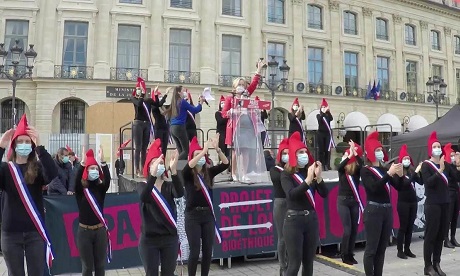In a written statement covering a range of ethical concerns, the French bishops permanent council urges Catholics to express their opposition to changes to France’s bioethics laws.
The proposed reforms have just passed the National Assembly on first reading and should be passed into law by early next year.
They will allow assisted procreation to be available to single and lesbian women and push back the deadline for a legal abortion.
Lining up the proposed reforms with Pope Francis’s recently-released encyclical Fratelli Tutti, the bishops ask:
“Can a society be fraternal when there is nothing better to offer mothers in distress than the elimination of the child they bear?”
“Can a society be fraternal when it organises the birth of children who will not have a father but, at best, a sperm donor?”
“Our society must not allow itself to be surreptitiously drawn into a dangerous path for the future of humanity.”
The proposed abortion legislation pushes back the deadline for legal abortions from 12 to 14 weeks. One of the reasons given for the extension is because the overworked state health system cannot always meet the current deadline.
The hanges to the assisted procreation law are significant, as unlike most other European Union countries, it is available only to heterosexual couples in France.
Fratelli Tutti is “a great text” that “calls our globalised world not to limit itself to the horizon of economic or political mechanisms but to choose fraternity with the poor,” the bishops say.
Their statement stresses their desire for more fraternity in relations between the secular and spiritual spheres in France, where attacks against religious symbols occur regularly, the bishops say in their statement.
Noting that Christian places of worship, mosques, synagogues and Jewish cemeteries are increasingly subject to degradation and sometimes even desecration, the French bishops say: “People are mocked and sometimes attacked and even killed, because of their real or perceived religious affiliation.”
Last week France’s Interior Minister Gérald Darmanin promised to find and prosecute those who attack churches, mosques and other religious edifices after an attempted arson strike on a Catholic church near Lyon.
Darmanin said, “Catholics had nothing to worry about,” after Paris declared it would change some regulations on faiths to better combat Islamist extremism.
Changes in regulations on religion must address all faiths, even if, as in this case, the real target is radical Islam.
Non-Muslim faiths sometimes oppose changes because they fear the changes could result in increased state interference in their activities.
Last weekend there were small demonstrations against the reforms throughout France. Although organisers included the same group that mobilised large protests against same-sex marriage in 2012-2013, protest numbers fell far short of that turnout.
Source
- The Tablet
- Image: Ruptly
